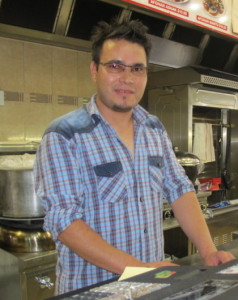Feeding a passion for self-reliance
It’s the lunch time rush in an eatery at Campbellfield in Melbourne’s north and an Australian couple sits in the window seat sharing a plate of kebabs; a Chinese family is sitting in a back corner eating pulao rice and two Turkish men in fluoro jackets are drinking lassis.
Welcome to the Afghan Kebab restaurant, an establishment opened recently by three asylum seekers serving traditional central Asian cuisine.

Since being granted work rights, dozens of asylum seekers across Melbourne have opened business and employed other asylum seekers and refugees
The trio pooled their money and borrowed more from friends to lease and fit out the premises, which sits presciently across the road from the soon-to-close Ford factory.
The partnership is just one example of how dozens of asylum seekers across Melbourne are opening businesses and employing others once they are granted work rights.
Restaurant partner and front of house manager Esmatullah Hakimi says he was prompted to open the business after knee injuries left him unable to do labouring work.
And after two months the restaurant is full each day for lunch and dinner and there are plans for a second business.
“I am so happy. We are more successful than I had hoped for. We ran out of supplies in the first week and had to order more,” Mr Hakimi says.
The business now employs another 12 people, including Afghans, Arabs, Iranians, and Indians.
Mr Hakimi, 32, says his customers include a wide spread of ethnicities who call the local area home.
“We have everyone come here… Europeans, Asians, Chinese, Arabs, Turks…,” he said.
“Most people come to try the food for the first time and become loyal customers.”
Mr Hakimi said that when his injuries precluded him from labouring work, he looked for another way to earn a living.
“I didn’t want to sit around doing nothing and getting handouts from Centrelink. I wanted to support myself and my family,” he said.
In Afghan culture there is a code of honour – we don’t like freeloaders.”
Mr Hakimi works from 9am until 11pm sometimes seven days a week. He says he is driven to provide for his wife and two children and also to provide work for people in similar circumstances to his own.
“I would love to open more restaurants so I can hire more people even if there might be less profit,” he said.
Mr Hakimi’s circumstances are not dissimilar to the 30,000 or so asylum seekers who come to Australia fleeing persecution, conflict, torture or worse.
The ethnic Hazara was a science teacher in Afghanistan but because his school was supported by a Christian charity, he was branded a heretic by the Taliban and was forced to flee to Iran.
“The Taliban said we could not teach science but only preach Islam. And because we were supported by a Christian group, we were accused of preaching Christianity,” Mr Hakimi said.
“I was ambushed by the Taliban twice but managed to escape. I was told the Taliban was after me and that I should leave.
“I went to Iran but I was there illegally and there were problems with the Iranian police so I went back to Afghanistan,” he said.
With his life still under threat in his homeland, in 2010 Mr Hakimi travelled to Malaysia, Indonesia and then by boat to Christmas Island.
He spent 20 months in immigration detention before he was released and his family joined him in 2013. He now has refugee status in Australia but his partners are asylum seekers on bridging visas.
Mr Hakimi says the business was four years in the making.
“It took me four years to understand how to run a food business in Australia. In Afghanistan I would know the city and market and it is much easier to open a shop,” he said.
“Here it is very different setting up a business. There is registration, hygiene standards… you need an ABN number.”
Mr Hakimi says that despite the long hours, the worry and the debt, his gamble on a business is worth it.
“I want to make a success of this business for myself and my family but also so I can employ people from the same background as me. They also need the chance to be independent and to make good lives for themselves,” he said.
Laurie Nowell
AMES Australia Senior Journalist












